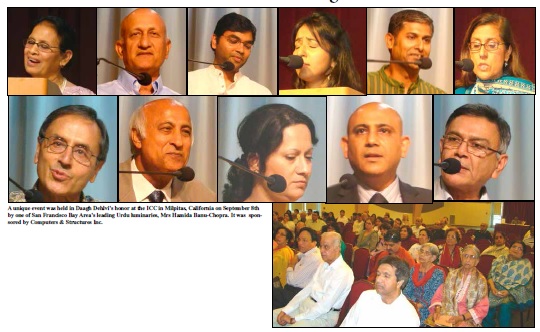The Mark of Delhi: Daagh Dehlvi
By Ras H. Siddiqui

He lived amongst the affluent but also led a life of hardship, and this cycle was repeated more than once in his life but in the end Nawab Mirza Khan would become the last of great classical Urdu poets of the Delhi School, from an era which began with the grandmaster of them all, Mirza Asadullah Khan Ghalib and his contemporary Sheikh Muhammad Ibrahim Zauq. Mirza Khan’s nom de plume or Takhallus, Daagh Dehlvi, in its literal sense would translate to the “Stained or tainted one from Delhi” but since we are in the realm of poetry here one can take some liberties to translate this penname from Urdu into English (an often difficult if not impossible task) so he becomes the Mark of Delhi for this writing.
Born in that city in the year 1831, Daagh died in Hyderabad (Deccan) in 1905 (rumor has it that he left this world on Valentine’s Day) leaving behind a rich legacy of ghazals and other writings inclusive of many mahavara’s (proverbs) making some of his work even more treasured.
A unique event was held in Daagh Dehlvi’s honor at the ICC in Milpitas, California on September 8 th under the title of Gulzar-e-Daagh organized by one of the San Francisco Bay Area’s leading Urdu luminaries Mrs Hamida Banu-Chopra and sponsored by Computers & Structures Inc. (CSI’s Ashraf Habibullah was present in the audience here). A gulzar (garden) of Daagh’s work was presented at this venue during which close to 200 enthusiasts of Urdu and Hindi inhaled his poetic fragrance. And for someone who had left this world over a century ago, he lived once again at the ICC for over two hours and even taught us a thing or two about life during this brief period.
Hamida Sahiba started the proceedings with a brief welcome and invited Khawaja Aftab Ali to the stage to preside over the event. Incidentally Khawaja Sahib happens to belong to the khandaan of another great poet by the name of Hali so his sadarat of this mehfil was due to both knowledge and lineage.
The first person to recite Daagh Dehlvi’s work was Amjad Noorani which included some matters of the heart and loss of life’s luggage. Anshuman Chandra, a student of Urdu, thanked both the ICC and his “ustad” or teacher Hamida for her guidance before presenting two of the poet’s ghazals which included couplets on betraying the self (Kiy Kiya Fareb Dil Ko Deye). And he was followed by Mrs Atiya Hai who used her convincing vocals to delve into the hopelessness of love ever present in some of Daagh’s verses.
Mrs.Hamida Banu-Chopra next presented an interesting biographic window into Daagh Dehlvi’s life. The poet tragically lost his father at a very young age and was fortunate that his mother remarried into the family of the Mughal rulers giving him an opportunity to spend a few years growing up in the Lal Qila (Red Fort) in Delhi. Things went well till the 1857 war of independence (aka Mutiny) after which Bahadur Shah Zafar, the last Mughal Emperor of India, lost his throne and was exiled. The Royal family or what was left of it struggled and his stepfather too soon passed away, forcing Nawab Mirza Khan (Daagh) to find refuge like many others in Rampur State (whose rulers incidentally did not act against the British in 1857). Later in life the poet left to reside in Hyderabad in the south where his success as a man of Urdu poetry and literature was sealed. His biggest contribution to Urdu was the legacy he left within thousands of his students who became active all over India (including present day Pakistan).
Drawing inspiration from Daagh poets like Jigar Moradabadi and the two Bekhud’s, he inspired another great poet known today as Allama Iqbal (even though the two never met). An interesting anecdote on Daagh shared by Hamida Sahiba here (on a lighter side) was his reply to another poet who complained to him and asked why his own poetry just didn’t have the attractive spirit that Daagh possessed. “Have you ever romanced a courtesan?” was the question-answer-hint he received in reply from Daagh Dehlvi.
Deepti Warrier next recited two of the poet’s works in tarrannum or song-like fashion in which she romanticized about names and about the one who taught others how to romance. And not to be left out Anil Chopra, whose well-known civil engineering skills sometimes have to take a back seat to support his wife Hamida’s lifelong romance with Urdu, presented his own views on the poet’s work and life!
Dr Muhammad Saleem Malik followed up with a wonderful synopsis of Daagh Dehlvi’s life leaving many in the audience literally amazed. He was followed by Ravi who used the poet's pulling of arrows out of chests and paths less travelled to entertain everyone. Dr Salman Siddique also presented two ghazals of Daagh, as the Sadr of the event Khawaja Aftab Ali next enlightened us further on the poet’s work before Anupama dazzled us with her fine voice about memories (Yaadain) and amazement.
Hamida Sahiba came back to formally close the program. She thanked Ashraf Habibullah of CSI for making this program possible and everyone else for their participation.
The Mark of Delhi or Daagh Dehlvi may not be alive today but his many contributions to the Urdu language live on. That people from as far away as the Defense Language Institute (DLI) in Monterey and California’s Capital City of Sacramento came to attend this program in the San Francisco Bay Area serves as a testimony to works of both the enthusiasts of the Urdu language like Hamida Sahiba and the poetic genius of Daagh Dehlvi.
Back to Pakistanlink Homepage

